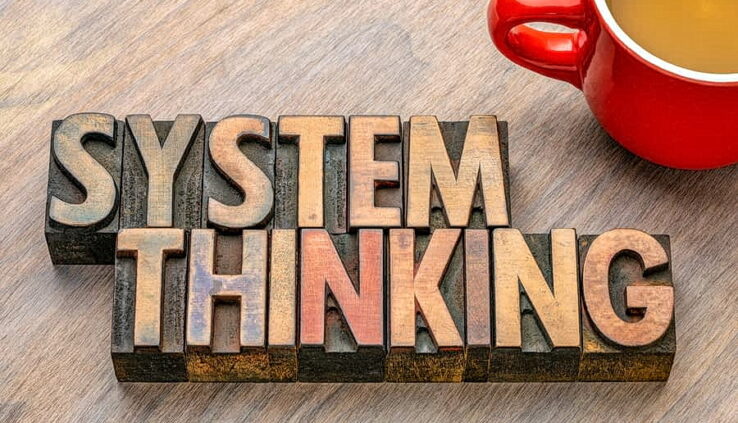A System-think Primer
System think is an intellectual way of life. It is essential to organize an increasingly varied set of intellectual pursuits to meet an increasingly novel, arriving future. Its weltanschauung impacts everything we think and do.
The urgency
Only “system think” can give you the choice ↓
- Survival ⇔ extinction
- Prosperity ⇔ bankruptcy
- Security ⇔ high anxiety
- Resilience ⇔ brittleness, instability
- Happiness ⇔ depression
- Social harmony ⇔ social degeneration
There’s no other way to exercise your inalienable rights.
Some definitions
All system definitions are eroded by the 2nd Law.
System: a set of two or more elements that satisfies three conditions:
- The behavior of each element has an effect on the behavior of the whole
- The behavior of the elements and their effects on the whole are interdependent
- Any subgroups that are formed, each has an effect on the behavior of the whole and none has an independent effect on it.
- System think:
- Identify the whole
- Explain its properties
- Explain its behavior in terms of its functioning
- Explain its behavior in terms of its purpose
- Determinism: precludes anything occurring by chance or choice. No parts are purposeful
- All subsystems of deterministic systems are deterministic
- Reductionism: reducing everything to ultimate, indivisible elements
- Reductionism is policy vs system think.
- Animated – the whole is purposeful but the parts are not
- Eco-social – Both parts and the whole are purposeful.
- Analysis – structure, how things work, yields knowledge, description, delves into things.
- No part of “you” is “you.” Only the whole you is you – and no one can understand you by analysis. You did not create your organs.
- Synthesis – functionality, why it acts as is does, yields understanding, explanation, delves into collective goal-seeking performance
- Definition of life, autopoiesis: The maintenance of units and wholeness, while components themselves are being continuously disassembled and rebuilt, created and decimated, produced and consumed.
- System types:
- Abstract system: a system composed only from concepts
- A concrete system: At least one or two of its elements are material objects.
- System state: the set of relevant properties the system has at a point in time
- System environment: a set of elements, not part of the system, that can produce a change in the state of the system
- Closed systems: insensitive to environment and feedback
- Open systems: sensitive to environment and feedback
- Homeostatic system: A static system whose elements and environment are dynamic.
- System reaction: a system event for which another event that happens to the same system or its environment is sufficient.
- System response: a system event for which another event that happens to the same system or to its environment is necessary but not sufficient.
- System behavior: a system event which is either necessary or sufficient for another event in that system or its environment.
- State maintaining system: can react only one way to an event, but reacts differently to different events. The different reactions produce the same state
- Goal-seeking system: can respond differently to events in one or more different events in one or more different states, until it produces a particular state.
- Process: a sequence of behavior that comprises a system with a goal-producing function.
- A purposive system: a multi-goal-seeking system displaying will. It can produce the same outcome in different ways in the same and different states. Humans are examples. It can choose between different outcomes and place different values on different outcomes.
- Ideal: an objective which cannot be obtained in any time period but can be approached without limit.
- Ideal-seeking system: one which after attaining any of its goals seeks another goal thought to be more closely associated with the ideal.
- High-performing system: One which can display a greater variety and higher level of behavior than any of its elements. Systems can be either variety-increasing or variety-decreasing. Neutral is impossible.
- Adaptive system types: other-other adaptation, other-self-adaptation, self-other adaptation, and self-self adaptation. At least one subset of the system has a system-control function.
- Control: the element which arranges for the behaviors necessary and sufficient for subsequent behavior to attain goals.
- Learning: increasing productivity in goal-seeking under unchanging conditions.
- Action classes: function, space, and time.
- Wisdom
- The ability to see the long-term consequences of current actions
- Going for long-run benefits
- Contented to control what is controllable
- Ecosystem: All ecosystems are living systems. Their reactions are determined by choices according to end Systems that only react to changing conditions cannot be purposeful. They have functions but not purpose.
- Growth
- Increasing differentiation of structure
- Increasing differentiation of function
- Problem solving categories:
- Absolution (ignore, deny)
- Resolution (good enough)
- Solution (fixed)
- Dissolution (designed out via system replacement)
- Greek classification of human activity
- The pursuit of truth
- The pursuit of power and plenty
- The pursuit of virtue
- The pursuit of beauty
- Development competencies:
- Increase our goal-seeking proficiency
- Increase availability of best resources
- Reduce social conflicts
- Include aesthetics
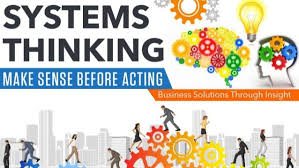
Concepts and tools
- The future can be what you want it to be.
- System performance depends more on the interaction of its parts, as per the vehicle in race mode, than any part.
- Understanding proceeds from the whole to its parts, not from its parts to the whole. And, because of the 2nd Law, understanding excellence has a shelf life.
- In business-as-usual organizational process, you look for solutions to problems from within and work your way out to system think only when every attempt failed. In systems engineering, you experiment with system changes to identify significant variables and the parts that need attention.
- The view of a system with fractal causes and effects by producer-product is teleologically superior to the standard viewpoints in terms of complexity reduction, because it includes specifying the system environment.
- Output-oriented specification – goals, objectives, ideals, responsibility
- Today, context change itself is always accelerating, reducing the life spans of all solutions.
- Control of change by anticipation is always preferrable to responding to its consequences.
- In changing times, dynamic equilibrium/stability can only be maintained by control theory.
- To develop is to increase one’s ability to satisfy one’s own needs and those of his social systems. Development is increasing in capability and competence, learning more than earning. It’s quality of life before standard of living.
- It is far more predictive of social success to measure the quality of work life provided to employees than its financial statements. Nothing can limit development. Many factors can limit the standard of living. You can grow too much, but not develop too much.
- Beliefs, feelings, attitudes, etc., can be attributed to a human by observing what he does. POSIWID These attributes do not lie behind behavior, but in it, hence observable. No machine can be understood except by reference to its purpose for which it is used by the purposeful suprasystem of which it is part. Machinery has no purposes of its own. Social ecosystems have purposes that distinguishes them.
- A theory includes a set of concepts, a set of assumptions, a set of deduced theorems, and instances of the theorems. A theory must explain those laws in the sense of introducing ideas with are more familiar and acceptable than those of the laws. It must predict new laws and these laws must turn out to be true.
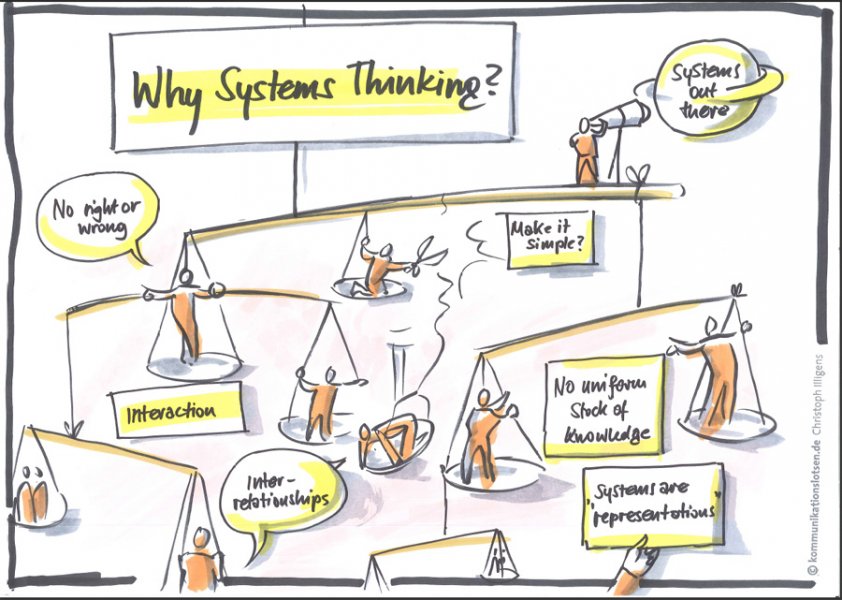
General Remarks
- The use of systems think is in the bowels of the hierarchy, not its head.
- Man is often like the fly on the trunk of an elephant who believes he is steering the beast. The belief delights the fly while the elephant is oblivious.
- Dynamic control of social behavior is like flying an airplane through a storm.
- As growth is essential for survival, the limit of contraction is extinction.
- Rare is that person who understands why he behaves as he does.
- In many social dysfunctions, the solutions to the problems encountered is shorter-lived than the time required to identify the problem.
- An overabundance of irrelevant information and maladaptive behavior generates angst.
- Change intolerance favors the path of least organizational resistance.
- Problems are to reality what atoms are to an artifact. You do not experience individual problems but complex situations featuring strongly entangled elements
- Going with the grain of natural law, developing immunity to changes that can’t be controlled.
- Not all changes are inevitable.
- In understanding social behavior, its truth is often veiled in a mist of intuition.
- In times of yore, one simple cause/effect was sufficient to explain all interactions:
- Is the cause both necessary and sufficient for its effect?
- The exclusive use of reductionism and determinism is mechanistic. The world as a machine, not merely like one.
- Since the industrial revolution, people became dehumanized machines, alienated from work, but fit for justifying class distinctions.
- Your system of thought manipulates symbols by some form of logic.
- Information processing is the basis of all regulation.
- Control systems themselves are not good or bad by themselves but what we make of them.
- Goal attainment can involve problems and possibilities that only system-think can address. Using subjective opinions of peers to design solutions is dereliction of duty.
- Eventually, by trial and error, the authorities realize their complete lack of population control and then make matters for themselves worse (executive overrides). Ethics plays no part in their reaction to demonstrated impotence. Excuses:
- The information input to the choice was faulty
- The process of choosing was faulty
- The choice was not faithfully implemented
- The environment changed in unanticipated ways
- Closed systems are oblivious to environment, impervious to environmental activity.
- When those to be “managed” have more knowledge and skills than the autocrats who rule them, managerial effectiveness on performance is lost.
- Performance is the product of interactions.
- The designer can no more act like a machine than a machine can act as its designer.
- Making progress is full of values, never value-free.
- Focus on the efficiency of goal-seeking with an eye on the aesthetics of such pursuits for multiplying effectiveness.
- The separation of ownership from managing operations that came during the 19th century was immaterial to the workforce
- Treat workers as human beings with purposes of their own.
- Increasing choice comes at the cost of increasing interdependency.
- Dealing with complexity is managing interactions more than actions.
- Keystones do not react passively to the information they receive.
- Your subconscious mind cannot decide on its own not to work for you.
- Loyalty, conformity, commitment, reinforced by security of the group
- Pulling rank induces insecurity and conflict
- By the very nature of its ideology, business as usual is incapable of handling conflict and making the changes required to flourish in uncertainty.
- Whenever the research on method is widely dispersed, it means there is a lack of unifying principles of a common conceptual framework.
- Organisms do not contain purposeful elements. Organizations are purposeful systems that can be variety increasing.
- The perpetrators of unhappiness are always aware of their inefficiency, ineffectiveness, and inhumanity.
- Progress towards ideals gives meaning to life, makes your choices significant.
- Reality-denial generations do not believe they are in control of their futures. They passively adapt to a toxic environment that is considered out of their control.
- Innovation is more about moving from question to question than it is moving from answer to answer.
- Two significant errors: rejecting concepts when they are valid; accepting them when they are false.
- To deprive stakeholders from entering the deliberations is to devalue them.
- To avoid endangering the largess they receive, the ruling class wants no change taking place in the society they rule.
- The less you understand the situation, the more variables you require to explain it.
- Responding to change should always bring improvement to system performance.
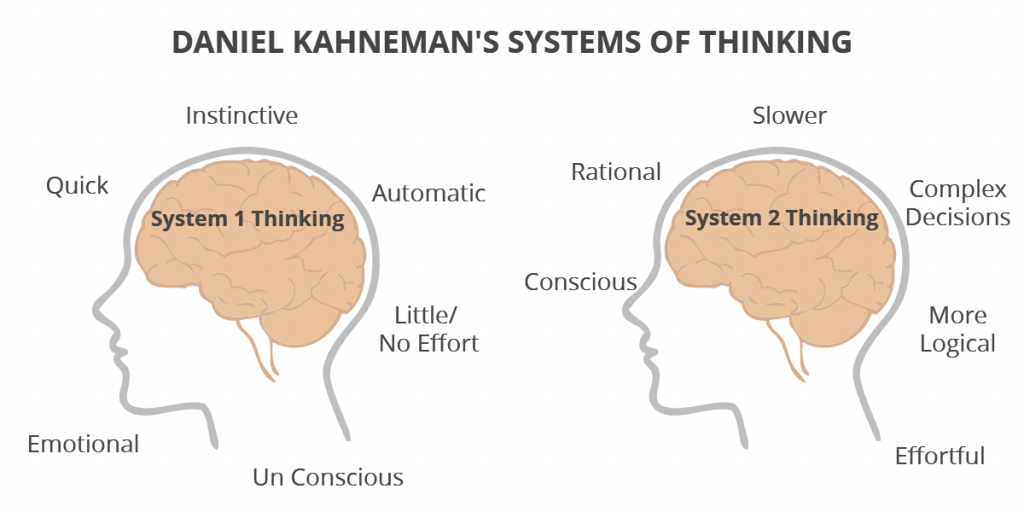
System think on Planning
Planning is uppermost in the complex and difficult intellectual activities that man can engage. It is predicting the future and preparing for it – in a technologically feasible and operationally-viable way.
Doing it poorly, like COVID, brings fractal and lasting consequences and misses opportunities. Planning is a decision-making process, special in various ways:
- Done in advance of taking action
- It is a system of decisions, interrelated:
- Too large to handle all at once
- Earlier decisions must be received in light of the decisions made subsequent to them
- Change takes place during the planning process. There is no stop rule for information gathering and knowledge building for planning purposes.
Its purpose is to arrive at future states which will not happen unless something is done ahead of time. It takes pains to avoid bad choices and to exploit developed knowledge. The wider the collaboration the better will be the prediction.
The longer the effect of a plan and the broader its scope, the more difficult it will be to undo. Strategic planning includes the formulation of goals and the process by which they are to be attained. The plan of action can be no better than its forecast of the future when it makes up its mind. We validate the Franceschi Fitting early in the planning process of prediction and preparation.
In predicting the future, the last resource to employ is your intuition. Unfortunately your intuition is always the first “system” to make your choices. In planning, subconscious mind imperatives are vetoed in the womb.
In business planning, false assumptions are commonplace and ruinous. Mission statements are dependably ruinous. Reaction-centered planners keep busy undoing changes that have already occurred.

Sets of attributes and imperatives
Inflexibility and intransigence: adaptation and contingency: holism, continuity, coordination, and integration, goals, objectives, ideals, stakeholders
Sequence of goal-seeking tasks: formulation, goal specification, means, resources, implementation, controls using the lessons of experience to redesign strategy. Inquiry is controlled, efficiently directed toward desired goal attainment
Information, knowledge, understanding:
- Certainty
- Uncertainty
- Ignorance
- Scientific mythodology
- Pompous proclamations
- The system as a whole controls the organization of which it is a part
- The diagnostic and prescriptive subsystem controls the management system
- This subsystem controls itself.
Asking questions, answering questions, solving problems, better procedures
Tools, techniques (the choices), and methods. Instruments, courses of action, methods (rules of choice)
Generalization is law-like. Particulars are fact-like.
Problems: evaluative and developmental.
Observation (criterion of relevance), generalization, experimentation, testing and repeating the design cycle
Means, traits, style
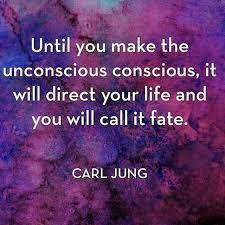
An example of system think
Working towards primary cause of today’s social dysfunction – far back in time to now. Starting the logic with social conditioning, unchanged since the Stone Age. Every generation is taught:
- Be not curious
- Don’t think for yourself
- Don’t believe your lying eyes
- Obedience to authority, infallible
- Abide the folklore and traditions of your culture
As civilization inexorably grows more technologically and structurally complex, the gap between invariant social conditioning and the operational reality widens at an increasing rate. Yes, it’s like the expansion of the universe by dark matter.
Sometime in the late 20th century, the inflection point was reached where social conditioning prevailed over the reality of social life. No longer could enough victims of mal-conditioning rise above their victimhood and become reality-centered producers..
The new generations decided the intellectual effort and commitment required to escape the dungeon of organizational dysfunction (OD) was worse punishment than the torture of staying put. At the same time, the social status of the reality producers (performance) was devalued when the population majority (consumers) went with social status by authority (opinion), reality-denial. As the ratio of reality deniers to reality embracers increased, the dominant trait of society locked in to autocracy.
Having the answer in hand, little effort is needed to realize that a piecemeal approach to the ills of OD could never get to ground zero.
As authoritarianism and autocracy hold sway over the quality of life, the pattern of insecurity, unhappiness, and powerlessness spreads and overtakes the governed masses, who form a baitball for self-defense – making them easy prey for the engulf and devour convenience of the ruling class.

Is yours a system problem?
There may very well be no greater blunder made in dealing with significant matters than to apply reductionist, piecemeal attention to components in a system-controlled issue. The consequences for making this error are automatically reinforced by the Nash Equilibrium. Trying to fix what is in reality a system issue by “fixing” its components is a total loss, a sunk cost. Every success in one area is reversed by reactions initiated by people in the other areas. Everyone has examples of this scenario in their own experience.
Exploiting this universal defect is the a mainstay of the insurance empire. Like the pharmaceuticals, insurance wants you to keep your efforts focused on the pieces and parts so your risk of being uninsured, unmedicated, will never diminish. Measuring the change in insurance premiums over time is a sure-fire way to distinguish system matters. Component problems get resolved and disappear. System problems are immune to reductionistic practices.
The important fact to keep in mind when choosing task action to take for system issues is that reductionism doesn’t work. That is, if you can determine is the matter at hand is or is not a system problem, any and all efforts you expend engaging components of the system will be futile, a lost cause. All alternatives fail, no part scores are possible.
Understanding that reality and respecting its lessons will, by itself, reward your investment in learning some system think. You can witness the wasted efforts of those who attempt to defy the laws of nature every day. What else is in the news but examples of treating system problems as simple cause-effect affairs? Note that in every case the reaction to inevitable failure is to double-down with what has proven to fail.

Distinguishing system-driven affairs
The first step in evaluation is to look for the trappings and scat of “system.” The sooner you can classify the situation, the more you will save yourself in wasted efforts. Characteristics of “system” matters include:
- Persistence and escalation of the issue regardless of standard practices
- Consistency with the history of similar attempts
- No feedback-driven lessons-learned
- The fractal nature of cause and effect in the world of system behavior is ignored.
- Decisions are made by intuition, not evidence
- Disturbances, foreseen or not, make thing worse. Closed systems are brittle.
- No authentic responsibility for outcomes
It is not difficult to classify a problem situation. Usually, if there’s enough ignorance about it to call for classification in the first place, the situation is a system. Deciding not to classify, because you fear the cognitive load, does not change the reality. The result is always a growth in consequences.
Views: 62


